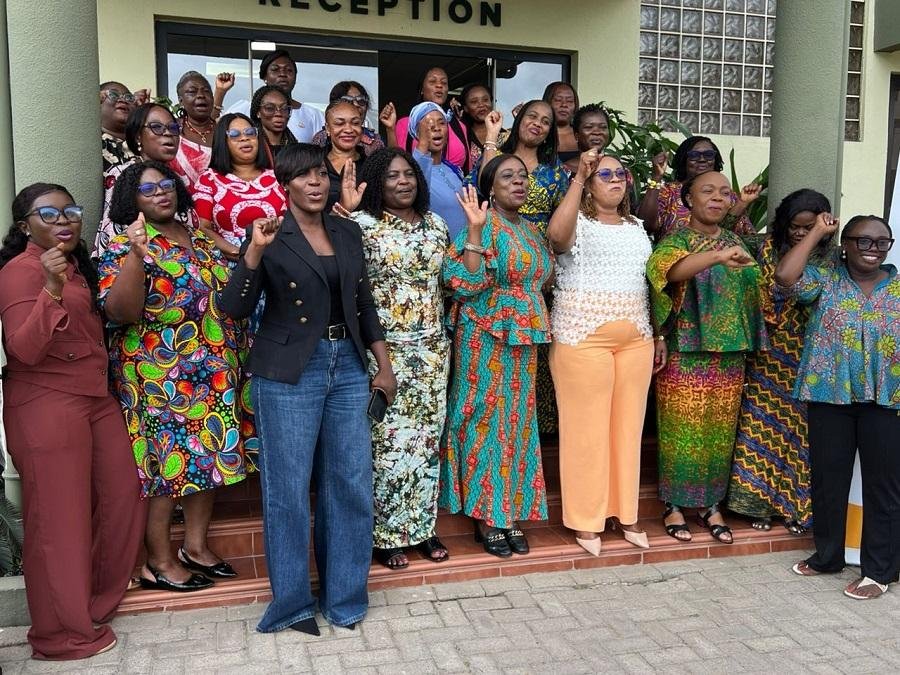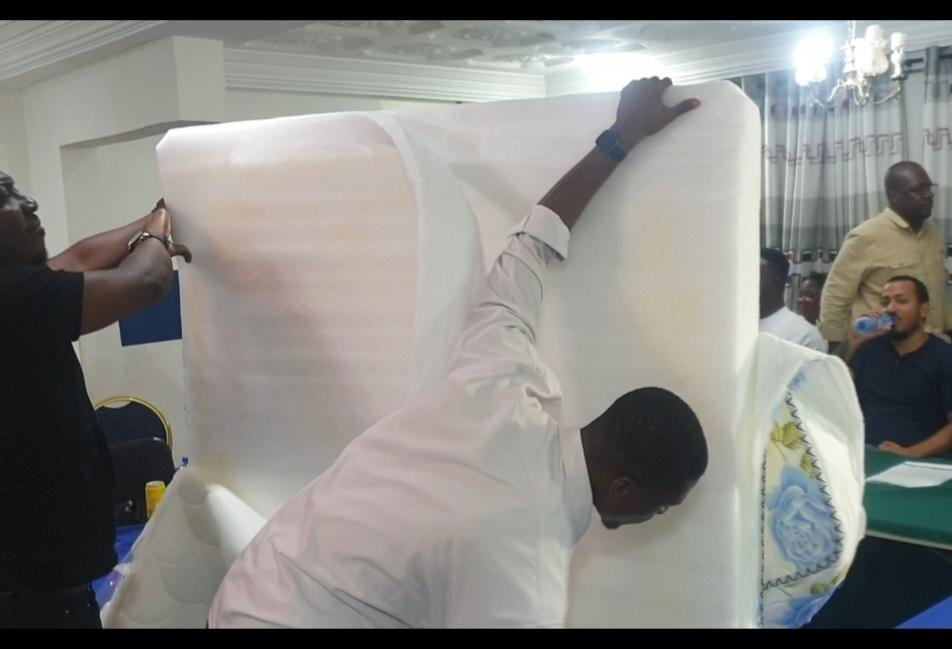News
Politicising gender-based violence harmful —Dakoa Newman

A Former Minister of Gender, Children and Social Protection, Ms Dakoa Newman, has called for an end to politicising gen der-based violence.
She said it should be “treated as a national emergency.”
According to her, politicising gender-based violence was harmful, as it distracts and deters women from achieving their political dreams.
“Gender-based violence in politics should not be politicised. If we truly want more women to participate, we must address these issues collectively. Some women are tagged with names such as witches, prostitutes just for contesting for elections.”
She said this during an engagement with non-elected women parliamentary candidates organised by Abantu for Development.
The session was on the theme “Strengthening Activism for a Gender-Responsive Elections 2024 in Ghana.”
The ex-MP for Okaikwei South stated that “Standing for election requires courage and sacrifice. As women, we often give up time with our families, our children, and our personal lives to pursue leadership. Whether you win or not, that effort must be recognised.”
Ms Newman noted that losing an election, while painful, should not mark the end of a political career. “It can be a stepping stone to new opportunities in governance and party leadership,” she added.
Recalling her own experiences during the 2024 elections, she stressed that political violence discourages many women from entering politics.
On financing, she urged partners and stakeholders to go beyond workshops and invest directly in women aspirants. “Financing is the number one barrier. Without resources, women cannot effectively compete. Organisations must support candidates with funding, research, and constituency-specific tools,” she emphasised.
Dr Mensah-Kutin, Chief Executive Officer (CEO) for Abantu for Development, revealed that 119 women contested in the 2024 parliamentary elections, out of which 78 did not win their seats.
She stressed that their contributions remained important for shaping future advocacy and strengthening women’s representation.
She also noted that although the Affirmative Action Law was passed in 2024, it came too close to the elections to be fully implemented, making platforms such as this engagement critical in pushing for increased participation of women in governance.
She called for full implementation of the Affirmative Action (Gender Equity) Act, 2024 (Act 1121), noting that its 30 per cent quota must be applied strictly across all levels of governance.
The event was supported by the African Women’s Development Fund (AWDF) which seeks to reflect on the experiences of women candidates during the elections.
By Linda Abrefi Wadie
News
Watch your mattresses!…they can cause chronic back pain, other health disorders

Local mattress manufacturers have raised serious concerns over the influx of substandard mattresses, warning that these products pose significant health risks to consumers and threaten the sustainability of Ghana’s mattress industry.
At a press briefing held in Kumasi on Tuesday, manufacturers accused unregistered foreign entities, particularly Chinese firms, of flooding the market with cheap mattresses made from polystyrene.
Mr Yaw Ampem Darko, a spokesperson for the local manufacturers, warned that prolonged use of substandard mattresses, especially those made with polystyrene, could result in chronic back pain, musculoskeletal disorders, poor posture, and diminished sleep quality.
These health implications, they stressed, were not always immediately evident but accumulate over time, especially among vulnerable populations such as children and the elderly.
This material, typically used for packaging, is considered unsuitable and unsafe for bedding.
According to industry leaders, these sub-standard products have been circulating for at least five years, gaining traction among unsuspecting consumers due to their unusually low prices.
“These mattresses are being sold at suspiciously low prices, luring unsuspecting consumers who are unaware of the health dangers.”
“We are not just protecting our businesses; we are protecting Ghanaian lives. The government must act swiftly to stem this tide before more citizens fall victim to these dangerous products,” Mr Yaw Ampem Darko stated.
The Ghana Standards Authority (GSA) has acknowledged the issue and, in response, announced a nationwide enforcement campaign aimed at clamping down on the production, distribution, and sale of substandard mattresses.
The campaign, which was scheduled to take effect from September 30, 2025, was empowered by the GSA Act, 2022 (Act 1078), which authorises the Authority to seize and seal non-compliant products and impose sanctions on offenders.
In a statement signed by the Director General of the GSA, Professor George Agyei, the authority cited Sections 29 and 43 of the Act, reiterating that all mattresses sold in Ghana must meet established national standards or face confiscation.
The statement further emphasised that mattresses failing to meet these standards not only compromise sleep quality but also contribute to long-term health complications, including spinal and neck pain.
Despite the GSA’s commitment, manufacturers have expressed frustration over delays in implementation and called for stronger enforcement mechanisms.
They urged the GSA to work in close collaboration with the Customs Division of the Ghana Revenue Authority and national law enforcement agencies to identify and prosecute violators of Ghana’s quality standards.
Manufacturers are also appealing to consumers to remain vigilant and prioritise their health by verifying that any mattress they purchase bears the GSA certification mark.
Moreover, they caution the public against purchasing suspiciously cheap mattresses that lack proper labelling or identifiable branding, as these were often indicators of substandard or counterfeit products.
As the official enforcement deadline had expired with no show, the local producers insisted that much more than business interests were at stake.
They argued that without swift and sustained action, the health and safety of Ghanaian consumers would continue to be compromised.
“Public awareness, strict enforcement, and collaboration among regulatory bodies are essential if we are to protect the integrity of the local industry and the wellbeing of the Ghanaian people,” Mr Darko indicated.
From Kingsley E. Hope, Kumasi
Join our WhatsApp Channel now!
https://whatsapp.com/channel/0029VbBElzjInlqHhl1aTU27
News
Raissa Initiative demands harsher punishment for sexual abusers of girls

The Founder of the Raissa Child Protection Initiative, Ms Raissa Sambou, has urged authorities to impose severe punishment on individuals, including teachers and guardians, who sexually abuse young girls.
Speaking in an interview to mark this year’s International Day of the Girl Child (October 11), Ms Sambou condemned the increasing cases of sexual exploitation involving minors, describing such acts as “heartless, criminal, and a total betrayal of trust.”
She noted that those entrusted with the care and education of children must not be the same people who violate them, stressing that “anyone found guilty of abusing a girl child must face the full rigours of the law without leniency.”
The International Day of the Girl Child is observed annually to promote the rights of girls, empower them to reach their full potential, and draw attention to the challenges they face worldwide.
Ms Sambou lamented that poverty continues to push many young girls into vulnerable situations, exposing them to exploitation.
She expressed concern that some headmasters, teachers, and community members who should protect girls rather take advantage of them.
“This must stop immediately. The safety of every girl must never be compromised,” she said, urging the public to report all forms of abuse to the appropriate authorities and called for swift action by law enforcement agencies against perpetrators.
Addressing girls directly, Ms Sambou encouraged them to take their education seriously and to believe in their potential.
“It is possible to be young and responsible. Your future is bright, protect it, believe in it, and never let anyone dim your light,” she advised.
She further urged girls to choose their friends wisely, stay disciplined, and speak up if anyone makes sexual advances toward them.
Ms Sambou concluded with a rallying call for collective action, saying “speak up, protect them, and empower them. Together, we can end the sexual exploitation of girls.”
By Esinam Jemima Kuatsinu
Join our WhatsApp Channel now!
https://whatsapp.com/channel/0029VbBElzjInlqHhl1aTU27














